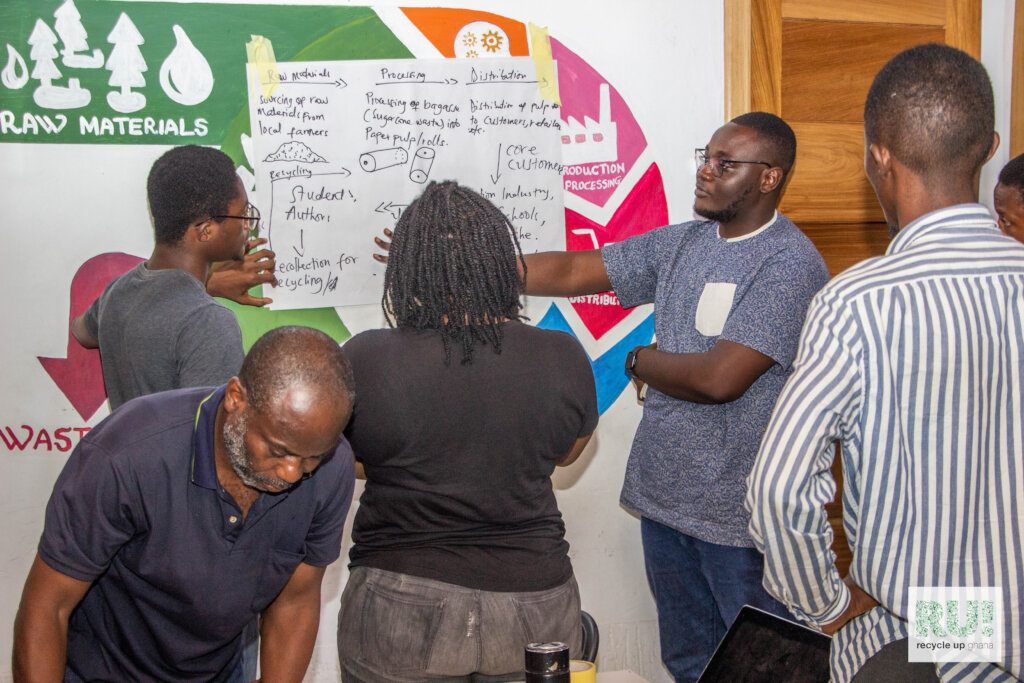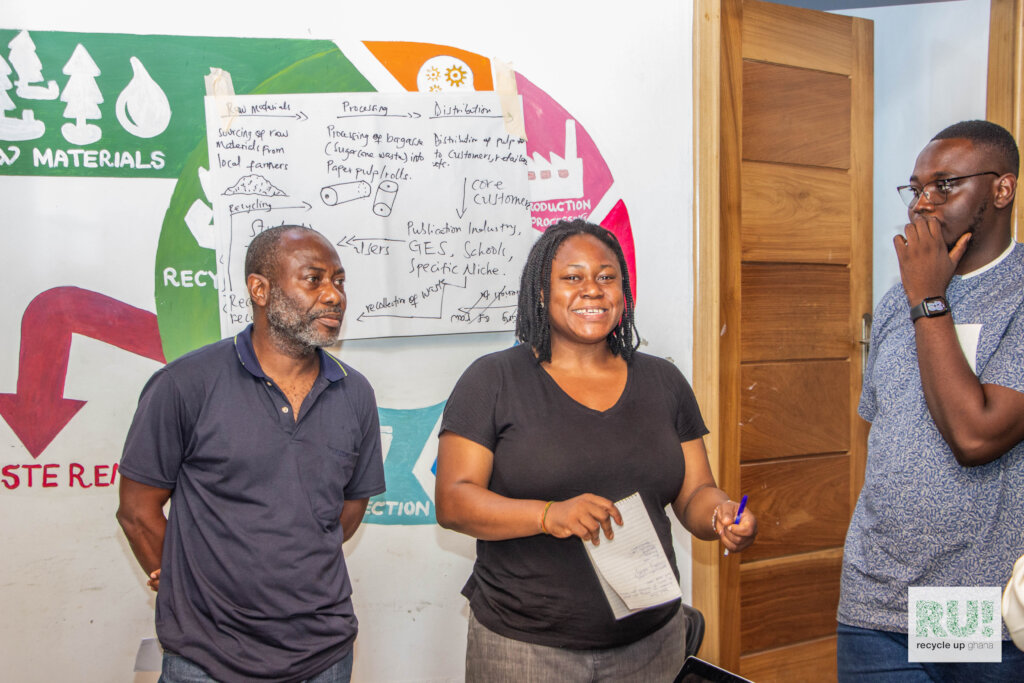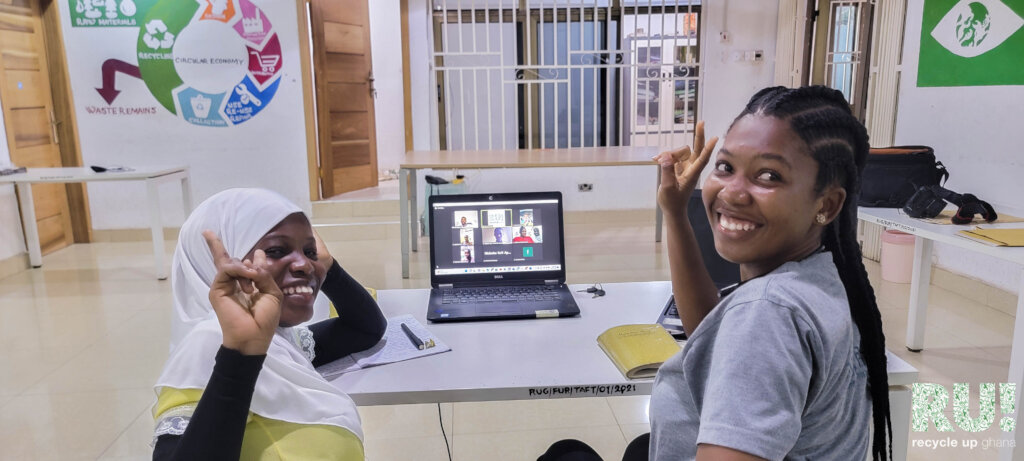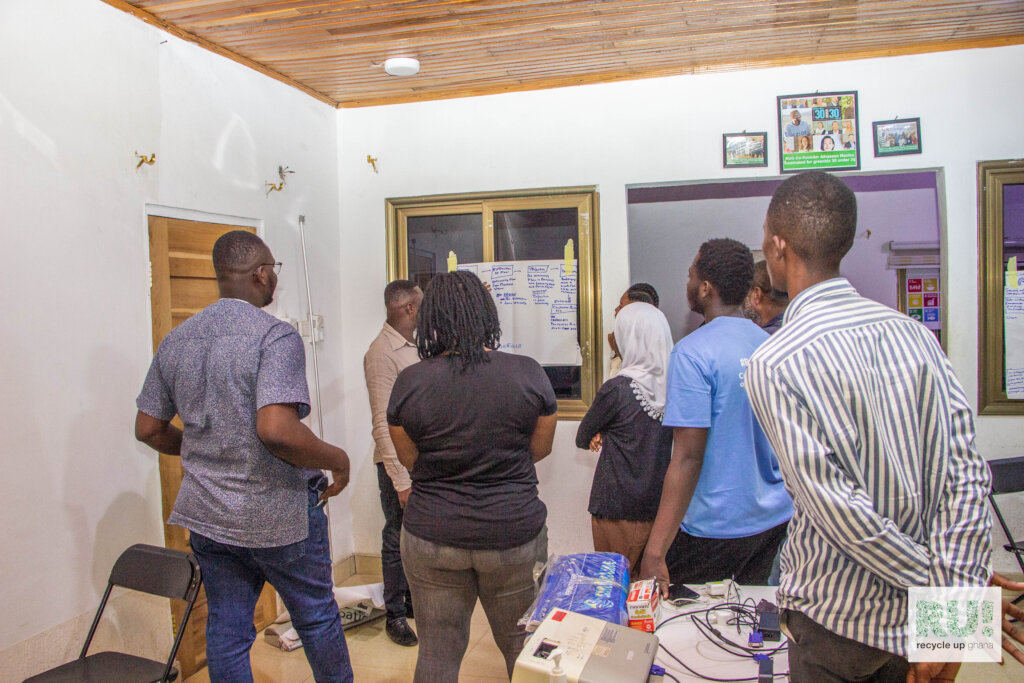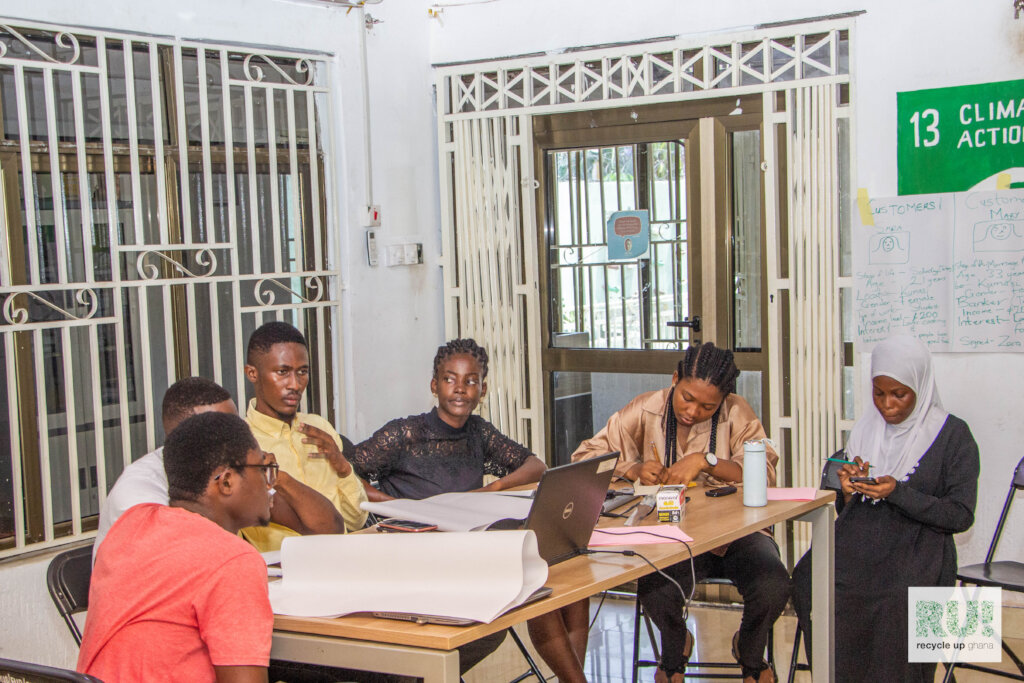By Seidu Salim Abubakar | Incubation Team Leader
Training Session on Green Business and Circular Economy
Introduction
The training session on Green Business and Circular Economy was held on April 19th, 2024. The session aimed to provide participants with a comprehensive understanding of the principles, challenges, and solutions associated with transitioning to a circular economy model. Facilitated by Alhassan Baba Muniru, the session sought to equip attendees with actionable insights to promote sustainable business practices and environmental stewardship.
Topics Covered
- Definition and Principles of Green Business and Circular Economy**: Emphasis on designing out waste and pollution, keeping materials in use, and regenerating natural systems.
- Understanding Circular Economy and its Importance: Exploration of economic, environmental, and social benefits associated with circularity in business operations.
- Challenges Faced in Achieving Circular Economy Goals: Discussion on infrastructural limitations, policy gaps, and consumer behavior patterns.
- Strategies and Solutions: Introduction to sustainable production methods, waste minimization techniques, and innovative recycling initiatives.
Conclusion
The session underscored the imperative of addressing environmental challenges through a circular economy lens. By fostering a deeper understanding of Circular Economy principles and promoting actionable solutions, participants are better equipped to drive positive change in their respective spheres of influence. The session served as a catalyst for inspiring collective action and advancing sustainable development goals.
Validating Your Green Business Idea" Training Session
Executive Summary
The "Validating Your Green Business Idea'' training session was held on May 9th and 10th, 2024, at the Recycle Up Ghana Hub. Facilitated by Mr. Ahmed Saalim Iddrisu and supported by the Incubation team (Faustina Adomako-Mensah and Zarawu Issah), the event aimed to provide entrepreneurs with design thinking skills to validate their green business ideas.
Key achievements included hands-on experience in prototyping, conducting user validation experiments, and analyzing the value chain.
The training session focused on teaching participants how to validate their green business ideas using design thinking principles. The goals were to:
- Develop skills in customer discovery.
- Enable effective competitor analysis.
- Teach prototyping and experimentation methods.
- Validate components of the business value chain.
Results and Findings
- Participant Engagement:Participants were highly engaged throughout the training, with interactive activities such as group discussions and hands-on prototyping.
- Knowledge Gain: Participants significantly increased their understanding of design thinking principles and validation techniques.
- Prototyping and Experimentation: Participants learned to create simple prototypes and conduct user validation experiments.
- Value Chain Analysis: The training provided insights into analyzing and validating components of the value chain.
Conclusion
The "Validating Your Green Business Idea" training session at the Recycle Up Ghana Hub was successful in achieving its objectives. The training was well-received, with high levels of participant satisfaction and practical takeaways. The positive feedback on the facilitator’s engagement and the applicability of the training content highlights the value of such initiatives in fostering innovation and entrepreneurship in the green business sector.
Green Business Model Canvas Training Session
Introduction
The Green Business Model Canvas training session, part of Recycle Up Ghana's incubation program for Cohort 5, aimed to equip participants with the skills to develop sustainable business models. Led by facilitator Douglas and the incubation team, the session focused on integrating environmental considerations into business strategies.
Virtual Session
The online session commenced on the 28th May with an in-depth exploration of the Business Model Canvas framework, emphasizing the importance of value proposition. Facilitator Douglas and the incubation team highlighted the significance of considering functional, social, and emotional value in green ventures. Through interactive discussions and case studies, participants gained insights into identifying and articulating value propositions that resonate with target customers while addressing environmental concerns.
In-Person Session
During the first in-person session on the 30th May, participants focused on developing a comprehensive business model for their green business idea. Facilitator Douglas, along with the incubation team, guided participants through the process of identifying key components of their business models, including green impacts, enabling environment, risk and opportunities, resources, customer segments, revenue streams, and cost structures. Through interactive workshops and group discussions, participants refined their business models, ensuring alignment with sustainability goals and environmental conservation principles.
On the final day of the training session which happened on the 31st May, participants engaged in an interactive session to build basic financial statements for financial planning. Facilitator Douglas, alongside the incubation team, provided guidance on developing income statements, balance sheets, and cash flow statements. Through practical exercises and hands-on activities, participants acquired the necessary skills to assess the financial viability of their green business ideas and plan for future financial sustainability.
Conclusion
The Green Business Model Canvas training session, led by facilitator Douglas and the incubation team, effectively provided participants with insights into value proposition considerations, business model development, and financial planning skills. Participants left the session equipped with the knowledge and tools to develop sustainable business models that address environmental concerns while meeting customer needs.
Impacts
Number of Training Sessions Organized Number of Entrepreneurs Reached
7 12
Direct Impact of Trainings on Startups
Participants gained a solid understanding of sustainable business practices and circular economy principles. They learned to design out waste, keep materials in use, and regenerate natural systems, enhancing their ability to promote environmental stewardship and resource efficiency.
Entrepreneurs developed crucial skills in customer discovery, competitor analysis, and prototyping. This enabled them to effectively validate and refine their green business concepts, leading to better market fit and increased potential for success.
Participants learned to develop comprehensive business models and financial statements,including income statements, balance sheets, and cash flow statements. By integrating environmental considerations into their strategies, they ensured the sustainability and viability of their green ventures, fostering long-term success and positive environmental impact.
UPCOMING EVENTS OR TRAININGS
This session will equip incubatees with strategies to enhance personal resilience, lead empathetically, and cultivate a positive work environment using mindfulness techniques and stress management.
Participants will receive practical guidance on developing and launching a Minimum Viable Product (MVP), gaining valuable insights into essential steps from concept to market launch.
This comprehensive workshop is designed to equip incubatees with the tools and strategies needed to effectively launch and scale their sustainable businesses.
Incubatees will learn key marketing principles tailored for green businesses, enabling them to effectively reach and engage with their target audience.
An interactive session aimed at forming dynamic teams and introducing incubatees to potential mentors who can provide guidance and support in their entrepreneurial journey.
This masterclass will equip incubatees with crucial knowledge to navigate legal complexities specific to pre-seed stage green businesses. Participants will gain insights into intellectual property rights, regulatory compliance, and essential contractual agreements necessary for establishing and scaling sustainable ventures.
This session will empower incubatees with skills to articulate their unique value, enhance credibility, and stand out in their industry. Participants will learn to build a strong professional brand that attracts stakeholders, fosters partnerships, and prepares their ventures for growth and investment.
The mentorship program will start with an introductory session connecting incubatees with mentors. Over the span of three months, this program will provide crucial guidance, foster professional growth, and facilitate networking opportunities. It aims to equip incubatees with the support needed to refine business strategies, overcome challenges, and accelerate entrepreneurial success.
Links:
Project reports on GlobalGiving are posted directly to globalgiving.org by Project Leaders as they are completed, generally every 3-4 months. To protect the integrity of these documents, GlobalGiving does not alter them; therefore you may find some language or formatting issues.
If you donate to this project or have donated to this project, you can receive an email when this project posts a report. You can also subscribe for reports without donating.
Support this important cause by creating a personalized fundraising page.
Start a Fundraiser